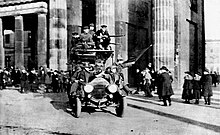Revolutionary Stewards
[4] The Stewards were a crucial force in organizing the January Strike of 1918, which was centred on Berlin, the Ruhr, Saxony, Hamburg and Kiel[5]: 22 and in which strikers demanded the end of the war through a negotiated peace and a democratisation of the empire.For this reason, the strikes were also directed against plans of annexation, which Central Powers Germany and Austria-Hungary were pursuing in ongoing peace negotiations with Soviet Russia in Brest-Litovsk.[5]: 24 In addition, unlike the Majority SPD led by Friedrich Ebert, they were also in favour of "socialisation" of industries and government by workers' and soldiers' councils rather than a parliamentary system.[7]: 100–103 In order to keep control of events and against his own anti-revolutionary convictions, Ebert decided that he needed to preempt the workers' councils and thus—whilst the formal head of government—also become the leader of the revolution.[7]: 119 From 16 to 21 December 1918, the Reich Congress of Workers' and Soldiers' Councils (Reichsrätekongress or Reichsversammlung der Arbeiter- und Soldatenräte) met in Berlin inside the Prussian Landtag building.The SPD members of the Council of the People's Deputies consequently dragged their feet over the implementation of the last two points, causing increasing resentment and anger among the labour movement and its more radical representatives like the Spartacists and the Stewards.[7]: 139–154 Although the Revolutionary Stewards supported the idea of a council republic rather than a parliamentary democracy, they rejected the Communist Party of Germany (KPD), founded on 30/31 December 1918, which pursued the same goal.This was because the KPD was not ready to accept the five conditions set by Richard Müller on behalf of the Revolutionary Stewards: withdrawal of the anti-voting decision[clarification needed], a program committee with equal representation, condemnation of "putschism", taking part in party publicity and abandonment of the additional name "Spartacus League".In the atmosphere of outrage created on the left by the military action against the Volksmarinedivision—which Liebknecht called "Ebert's bloody Christmas"—the Stewards were among the initiators of the Spartacus Uprising (Spartakusaufstand) in January 1919.At a meeting at the police headquarters attended by Eichhorn, 70 Stewards, ten members of the USPD led by Georg Ledebour, three representatives of the soldiers, and Liebknecht and Wilhelm Pieck for the KDP, the men were caught up in the momentum of the hour and lost sight of the real situation, overestimating the support for their actions from the military in the Berlin area.The Stewards' representative Paul Scholze [de], Karl Liebknecht (KPD) and Georg Ledebour (USPD) now signed a proclamation demanding the toppling of Ebert's government.He made Gustav Noske, since the withdrawal of the USPD a member of the Council of the People's Deputies, the military commander-in-chief and rallied the regular troops of the Berlin area to his cause.[8] The struggles, at times approaching the level of civil war, which took place in some regions of Germany in the following months put the council movement increasingly on the defensive.After the defeat of the council movement, the Revolutionary Stewards still had influence and called for and helped execute a general strike against the right-wing nationalist and anti-democratic Kapp Putsch of March 1920.However, in some parts of Germany, the striking workers refused to return to work and offered armed resistance to the legitimate government of President Ebert and Chancellor Bauer.Towards the end of 1922, the core of the local structures of the USPD in Berlin, which continued to exist as a small party, was composed largely of former Revolutionary Stewards.



First World Warshop stewardsGerman EmpireSocial Democratic PartyGerman Revolution of 1918–19Richard Müllercouncil republicwar bondsKarl LiebknechtReichstagMajority SPDBurgfriedenspolitikEmil Barththe protest strike against the trial of Karl Liebknecht in summer 1916BraunschweigLeipzigJanuary Strike of 1918BerlinSaxonyHamburgBolsheviksTrotskyOctober RevolutionGermanyAustria-HungaryBrest-LitovskSupreme Army CommandGeorg von HertlingSpartacist uprisingGerman workers' and soldiers' councils 1918–1919Friedrich Ebertsocialisationworkers' and soldiers' councilsMax of BadenWilhelm IICouncil of the People's DeputiesPrussian LandtagSpartacistsChristmas crisisVolksmarinedivisionCommunist Party of GermanySpartacus UprisingEmil EichhornSecurity PolicePaul HirschVorwärtsGeorg LedebourWilhelm PieckGustav NoskeBremenBavarian Soviet RepublicFreikorpsWeimar ConstitutionKapp PutschRuhr UprisingReichswehrFree Workers' Union of GermanyPM PressErnst Däumig